June 8, 2016
Edited by David Sanders
Specimen Days
1611—Jean Bertaut, French poet (b. 1552), dies
1889—Gerard Manley Hopkins, poet, dies at 54.
1905—Brian Coffey, Irish poet (Avent), born in Dublin (d. 1995), is born.
1920—Gwen Harwood, Australian poet (d. 1995), is born.
1931—Ivan V. Lalić, Serbian poet, born in Belgrade (d. 1996), is born.

The world's more than the sum of things
like moon, sky, centre, body, bed,
as all the singing masters know.
Picture two lovers side by side
who sleep and dream and wake to hold
the real and imagined world
body by body, word by word
in the wild halo of their thought.
—from “Thought Is Surrounded By A Halo” by Gwen Harwood (1920-1995)
“The world’s more than the sum of things / like moon, sky, centre, body, bed” — Gwen Harwood
World Poetry
Poetry Book Society Winds Down Activities
The Poetry Book Society (PBS) is winding down after more than 50 years supporting and encouraging the art of poetry and the sale of poetry books, with all staff made redundant. Founded in 1953, the PBS has worked as a book club for committed poetry readers, offering selections of the best new poetry collections of the quarter, chosen by the poet selectors. Inpress, a not-for-profit organisation that provides marketing and distribution services for independent publishers, will be taking over the book club portion of the society and will continue to provide PBS members with the quarterly selectors’ choice book of poetry and bulletin. Management of the T S Eliot Prize, previously handled by PBS, meanwhile, has been assumed by the T S Eliot Foundation. In this new capacity, the society will maintain its branding and members, but all its three staff have been made redundant.
The Poetry Book Society is winding down after more than 50 years supporting and encouraging the art of poetry.
Recent Reviews
Selected Later Poems by C. K. Williams

When C. K. Williams died last year, he left behind more than half a century’s worth of superb work as well as a sterling reputation attested to by a Pulitzer Prize, a National Book Award, and a National Book Critics Circle Award. Williams has always been a versatile poet—like his hero, Whitman, he contained multitudes—but he was best known early in his career as a political poet in the Vietnam era.
Ernest Hilbert’s Street Music
by Micah Mattix

Most Americans don’t like to talk about death, but Ernest Hilbert doesn’t mind. Death and decay is what he sees in Caligulan—his third volume of poems after Sixty Sonnets (2009) and All of You on the Good Earth (2013)—and he has little interest in spinning “Fictions fielding hopes of glory / Where none should be fulfilled.” This is a question of temperament, as the title suggests, and reality. However we might feel, it’s relatively clear that the “seams” of order, as Hilbert puts it in one poem, have been “unsewn.”
In Rita Dove’s Verse, Loss, Despair and Bedrock Pleasures
by Dwight Garner
To read the poems of Rita Dove, to go where they take you, is to follow her deeply into a series of themes and their subsets: African-Americans in history and right now, ideas of indenture and independence, sex, travel, language (she compares commas to “miniature scythes”), family, motherhood, roomy adult love and whatever is coming out of the radio.
Poetry by Kim Addonizio, Ocean Vuong, Rachel Richardson
by Diana Whitney

Only Kim Addonizio could mix Greek myths with psychopharmacology, Dante with a pinging iPhone, heartbreak with plastic pollution, and create a rare cocktail of wit and desire. After immersing herself in prose (an agile book of short stories, a forthcoming memoir), Addonizio serves up Mortal Trash (Norton; $25.95), her stunning seventh collection. “I started as a poet and will always return to poetry — both reading and writing it — for that sense of deep discovery and communion I find there,” she told Contemporary Authors.
Could Be Verse
Ben Lerner finds hope in the dislike of poetry
by Meghan O’Rourke
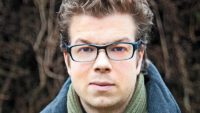
For an esteemed art form, poetry certainly spends a lot of time defending itself against haters and skeptics. The attacks (and subsequent defenses) go all the way back to Plato, through Percy Bysshe Shelley, and haven’t slowed in recent years. The American poet and novelist Ben Lerner shares the impulse both to attack and to defend, and his book The Hatred of Poetry is one of the best denunciations of the genre of lyric poetry I have read—and one of the more intriguing defenses.
Kim Addonizio mixes Greek myths & psychopharmacology, Dante & a pinging iPhone, heartbreak & plastic pollution.
Broadsides
Pounded, Dazzled, Astonished, Beaten and Broken: Martina Evans on Being a Poet
As her Selected Poems are published, the poet reflects on her inspirations and obsessions (snakes in the bed, republican women and the Mammy of all Irish Mammies)
by Martina Evans

When I gathered all the poems that I’ve written in the last 27 years and sat down to condense them for my Selected Poems, not many snakes made the grade but lots of Mammy poems did and the priests and the nuns and horses and London (I have urban poems now), cowboys, Elvis, gardens, the War of Independence and always lurking at the borders – half helpless characters dreaming of murder. I can’t choose my subject matter, it presents itself and then I do the best I can with it.
Poster Poems: Buildings
From Louis MacNeice at the British Library to Elizabeth Bishop’s Filling Station, some poets are good at recording life’s often unnoticed settings. What do you see?
by Billy Mills
There can at times be a tendency to think of poetry as being primarily concerned with the natural world and fine emotions, a precious art divorced from the realities of everyday life. However, as regular readers of this series know, poems can be and have been written about almost anything. Take buildings, for instance. Most of us spend the best part of the day in or around one or more of the things. The majority are fairly prosaic and their very ubiquity tends to blind us to their features and characteristics – and yet, there is a rich vein of building-inspired poetry out there.
Martina Evans writes poems on the priests and the nuns and horses and London, cowboys, Elvis, and more.
Drafts & Fragments
VOTE: Should pavement poet defying council ban be prosecuted?
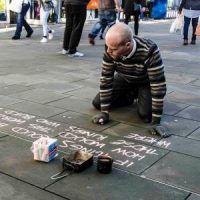
A street poet who has been banned by the council from scrawling his words on the streets of Swindon is back, with the officials behind the ban his latest targets. Danny Rowland, formerly Danny Lake, took to Regent Street on Friday to mock the council’s lack of enforcement action since the announcement of new powers earlier this year. A Public Space Protection Order (PSPO) was introduced in February to cover the town centre – it focuses on issues such as keeping dogs on leads, begging, aggressive charity collecting and public drinking.
A Swindon poet who was banned by the council from scrawling his words on the streets of Swindon is back.
Poetry In the News
Social Media Buzzing over Harvard Grad’s Poem

Social media is buzzing over a Harvard graduate’s poetic commencement speech, which has garnered millions of views and the attention of celebrities. Donovan Livingston, who received his master’s degree in education, addressed his classmates Wednesday with a spoken-word poem outlining the historic obstacles that have prevented African-Americans from getting an education.
ASU Regents’ Professor Norman Dubie wins Griffin Poetry Prize
Norman Dubie, Arizona State University Regents’ Professor of English, was awarded the 2016 international Griffin Poetry Prize for his collection "The Quotations of Bone," an exploration of viciousness and humanity. It is his 29th collection of poems.
Yale Students Fight to Abolish Shakespeare, Other Dead White Dudes From English Curriculum
Spending several months in the company of dead white men is no one's idea of a good time. But for English majors at Yale University, it's a fact of life — and a mandate for anyone hoping to graduate. Students in Yale's English department are currently required to spend two semesters studying the so-called "major English poets": Geoffrey Chaucer, Edmund Spenser, William Shakespeare, John Donne, John Milton, Alexander Pope, William Wordsworth and either T. S. Eliot or another modern poet of the student's choosing. But that could be changing soon.
Social media is buzzing over Harvard graduate Donovan Livingston’s poetic commencement speech.
New Books
The Hatred of Poetry by Ben Lerner
[Paperback] FSG, 96 pp., $12.00
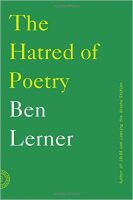
No art has been denounced as often as poetry. It's even bemoaned by poets: "I, too, dislike it," wrote Marianne Moore. "Many more people agree they hate poetry," Ben Lerner writes, "than can agree what poetry is. I, too, dislike it and have largely organized my life around it and do not experience that as a contradiction because poetry and the hatred of poetry are inextricable in ways it is my purpose to explore." In this inventive and lucid essay, Lerner takes the hatred of poetry as the starting point of his defense of the art.
The Griffin Poetry Prize Anthology 2016 edited by Adam Sol
[Paperback] House of Anansi Press, 120 pp., $19.95
Each year, the best books of poetry published in English internationally and in Canada are honored with the Griffin Poetry Prize, one of the world’s most prestigious and richest literary awards. Since 2001 this annual prize has acted as a tremendous spur to interest in and recognition of poetry, focusing worldwide attention on the formidable talent of poets writing in English and works in translation. And each year The Griffin Poetry Prize Anthology features the work of the extraordinary poets shortlisted for the awards, and introduces us to some of the finest poems in their collections.
A Small Porch: Sabbath Poems 2014 by Wendell Berry
[Hardcover] Counterpoint, 80 pp., $25.00

This new sequence for the following year is one of the richest yet. This group provides a virtual syllabus for all of Mr. Berry’s cultural and agricultural work in concentrated form. Many of these poems are drawn from the view from a small porch in the woods, a place of stillness and reflection, a vantage point “of the one/life of the forest composed/of uncountable lives in countless/years each life coherent itself within/ the coherence, the great composure,/of all.” A new collection of Wendell Berry poems is always an occasion of joyful celebration and this one is especially so.
In the Empire of the Air: The Poems of Donald Britton edited by Reginald Shepherd and Philip Clark
[Paperback] Nightboat, 128 pp., $16.95
Described as “dazzling” by Edmund White and as a poet “who has The Gift and delivers The Goods” by Kenward Elmslie, Donald Britton published just one book of poetry, Italy, before his death from AIDS in 1994. In the Empire of the Air: The Poems of Donald Britton reprints Italy alongside previously unpublished and uncollected poems to display the full range of Britton’s fresh, vivid language and subtle humor. It is poetry by turns glamorous, wistful, intellectual, and elegant, the sharp-eyed observations of a penetrating mind lost to the world too soon.
Certain Magical Acts by Alice Notley
[Paperback] Penguin Books, 160 pp., $20.00
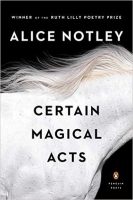
Alice Notley has become one of the most highly regarded figures in American poetry, a master of the visionary mode acclaimed for genre-bending book-length poems of great ambition and adventurousness. Her newest work sets out to explore the world and its difficulties, from the recent economic crisis and climate change to the sorrow of violence and the disappointment of democracy or any other political system. Notley channels these themes in a mix of several longer poems – one is a kind of spy novella in which the author is discovered to be a secret agent of the dead, another an extended message found in a manuscript in a future defunct world – with some unique shorter pieces.
Alice Notley has become one of the most highly regarded figures in American poetry.
Correspondences
“Building an Architecture for the Wanderer”: A Conversation with Nathalie Handal
by Rachel Morgenstern-Clarren
Groundbreaking poet, playwright, and editor Nathalie Handal is one of our most diverse contemporary writers, and as the Washington Independent Review of Books writes, it’s with “startling force [that she] is building an architecture for the wanderer.” Her many honors include being a Lannan Foundation Fellow, the winner of the Alejo Zuloaga Order in Literature, and an Honored Finalist for the Gift of Freedom Award. Raised in Latin America, France, and the Arab world and educated in the United Kingdom and the United States, the award-winning writer now lives in New York City.
Griffin Prize Judge Alice Oswald on Canadian Poetry's Humour, Modesty
by Jared Bland
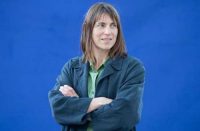
In addition to recognizing the best poetry at home and abroad, the Griffin Prize has a long-standing tradition of recruiting truly outstanding judges. This year’s group includes the British poet Alice Oswald, author most recently of Memorial, an exceptional volume of verse that reimagines Homer’s The Iliad. Ahead of this year’s ceremony, The Globe asked Oswald about her experience on the prize jury.
Boundary-breaking Poetry
by Zack Hatfield

Rebecca Lindenberg’s thoughts on poetry changed forever in the seventh grade. The Northern California native read poems by Federico García Lorca in both Spanish and English. Poetry put a name, and a career, to Lindenberg’s natural hunger for words. “I remember thinking, ‘Wait. You can do that?’ and almost immediately, ‘I want to do that,” the College of Arts & Sciences visiting assistant professor said. “I think I’ve always been the sort of person who felt restless with everything until I could find the exactly right words to describe it to myself, the sort of person who has always used language as a tool or even organ for perception.”
Frederick Seidel: ‘It's necessary to criticise the left’
New York’s ‘Kanye Baudelaire’ talks to Lorin Stein about Donald Trump, departed friends and why a life without writing is pointless
by Lorin Stein

Frederick Seidel is no one’s idea of a protest poet. Born in a well-to-do suburb of St Louis, Missouri, educated at Harvard, encouraged early on by Ezra Pound and Robert Lowell, he has always written from firmly within the establishment. From the beginning, his poems showed an intimate acqaintance with the powerful and the beautiful, and a fascination with the accoutrements of wealth.
Frederick Seidel: “It’s necessary to criticise the left.”
Envoi: Editor’s Notes
In the interview posted above, Rebecca Lindenberg remarks on the effect of reading Garcia Lorca for the first time: "Wait. You can do that?" she asks. As I paged through some of the books on my shelf waiting my summer reading, I encountered the same sensation especially with poems in translation. One such poem is from an anthology of Swedish poets titled The Star By My Head. The title of the poem is "Arrived." It's by Bruno K. Öijer… enjoy:
ARRIVED
even the lakes along the road
lay gray and exhausted
after several weeks of rain
but I had finally arrived
got out of the car with all my stuff
the old house painted red
with its tile roof and wood stove
could not contain itself
tore away from the edge of the wood
and ran towards me with open arms
along the sky
nothing but thick long streaks of clouds
like the tire marks from spirits
come to stop in midair
startled into silence at what they saw